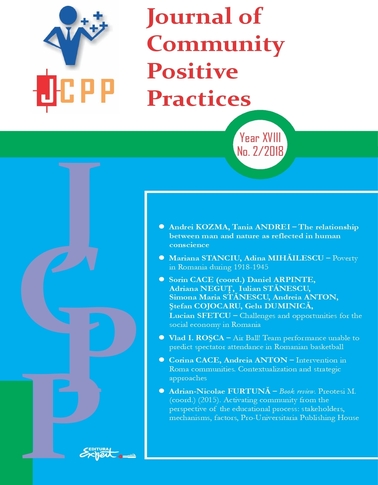THE RELATIONSHIP BETWEEN MAN AND NATURE AS
REFLECTED IN HUMAN CONSCIENCE
THE RELATIONSHIP BETWEEN MAN AND NATURE AS
REFLECTED IN HUMAN CONSCIENCE
Author(s): Andrei Kozma, Tania AndreiSubject(s): Social development
Published by: Asociatia pentru Dezvoltare si promovare socio-economica Catalactica
Keywords: man-nature report; consciousness; matter intelligence; environment; human society;
Summary/Abstract: Man's removal from the natural environment and his anthropocentric positioning in the anthropic environment are the result of a long cultural development. The path from man as part of nature to man as the master of nature goes through changing patterns of thought and action. Founding/cosmogonic myths have supported, in the consciousness of humanity, the feeling of belonging to nature as a place of genesis and the becoming of man. When man was no longer identified with nature and extracted from its systemic functioning, he became a user of the resources generously offered by nature. Thus, the development of human habitats was done with the decline of the natural environment and at the expense of the alienation of man from nature. The nature that gives us everything and does not request anything in return now appears as a lost paradise that we are looking for inside us. The operation of the natural environment on Earth is a model of systemic organization in which the intelligence of matter is an everyday observable reality. Living according to natural rules is a profoundly religious experience of meeting with eternity, finding the lost paradise. That is why the return to nature in the sense of observing and reproducing a model of action and organization, validated by the very functionality of the planet, may be the solution to the salvation of human society from self-destruction. In the first part of the article, the authors deal with patterns of thought and action in the relationship between man and nature in archaic societies versus contemporary society, continuing with aspects of human intervention in the functioning of natural systems. At the end of the article, the authors emphasize the need of a shift in paradigm in the approach to nature. In conclusion, modern man's attempt to dominate and control nature has only disturbed and distorted the natural environment on Earth. All the aggressive changes induced on nature produce natural hazards that can no longer be managed and controlled, turning into threats to human society. In this context, the paradigm shift means respect for nature, understanding its functioning mechanisms, and developing a preventative behavior to preserve the natural balance of the environment.
Journal: Jurnalul Practicilor Comunitare Pozitive
- Issue Year: XVIII/2018
- Issue No: 2
- Page Range: 3-12
- Page Count: 10
- Language: English

